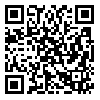BibTeX | RIS | EndNote | Medlars | ProCite | Reference Manager | RefWorks
Send citation to:
URL: http://rehabilitationj.uswr.ac.ir/article-1-1073-en.html
2- Occupational Therapy Department, University of Social Welfare and Rehabilitation Sciences, Tehran, Iran. ,
3- Pediatric Neurorehabilitation Research center, University of Social Welfare and Rehabilitation Science,Tehran,Iran.
Objective: Although considerable research has been conducted on awareness of and respect for patients' rights in the country, few have been implemented in the rehabilitation field. The aim of this study was to investigate about the awareness rate of rehabilitation clients and therapists, about the “patients' rights charter" in the phase of treatment.
Materials & Methods: This descriptive-analytic study was conducted at two university-affiliated centers of the University of Welfare and Rehabilitation Sciences, in 1389-90. 103 clients and 28 therapists were recruited by convenient sampling. Data collection was carried out using 2 forms of questionnaires: that of therapists and of clients, the reliability and validity of which were confirmed. Data were analyzed using Pearson’s correlation coefficient.
Results: 44 female and 59 male clients as well as 20 female and 8 male therapists participated in this study. Awareness level of the clients about the "patients' rights charter" was: 47/6% poor, 16/5% moderate and 35/9% good. There was no significant relationship between clients' awareness with age, sex, and setting. However, significant relationship was found between the level of awareness and the education level, number of visits, and the rehabilitation unit (P<0/05). Awareness level of the therapists about the "patients' rights charter" was: 32/1% poor, 14/3% moderate and 53/6% good. There was no significant relationship between therapists' awareness with age, sex, degree level, and field of expertise. However, significant relationship was found between level of awareness and work location (P<0/01).
Conclusion: Considering the fact that rehabilitation clients are one of the most vulnerable groups, with special needs and low awareness of their rights, improving rehabilitation performance and patient satisfaction requires improvement in public awareness about rehabilitation services and client rights. as well as research on and development of strategies for following clients’ rights, by policy makers of the health care system, especially for rehabilitation services.
Received: 3/04/2012 | Accepted: 3/07/2013 | Published: 3/07/2013
| Rights and permissions | |
 |
This work is licensed under a Creative Commons Attribution-NonCommercial 4.0 International License. |





